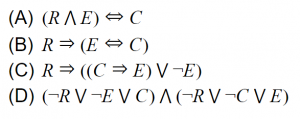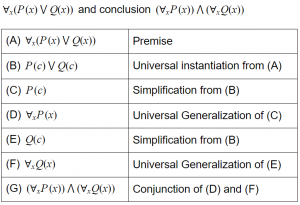Knowledge representation-Artificial Intelligence UGC NET June-2020
| Question 1 UGC NET June-2020 Consider the statement below. A person who is radical (R) is electable (E) if he/she is conservative (C), but otherwise is not electable. Few probable logical assertions of the above sentence are given below.  Which of the above logical assertions are true? Choose the correct answer from the options given below: |
| A – (B) only |
| B – (C) only |
| C – (A) and (C) only |
| D – (B) and (D) only |
Show Answer With Best Explanation
| Question 2 UGC NET June-2020 Consider the following argument with premise.  |
| A – This is a valid argument. |
| B – Steps (C) and (E) are not correct inferences |
| C – Steps (D) and (F) are not correct inferences |
| D – Step (G) is not a correct inference |
